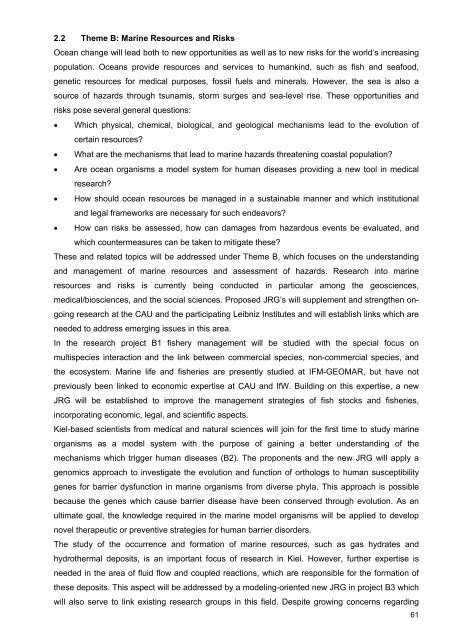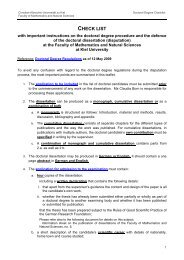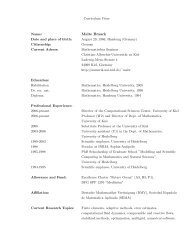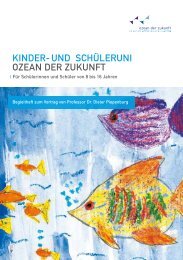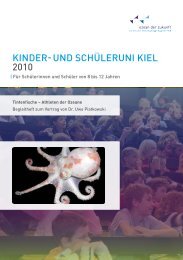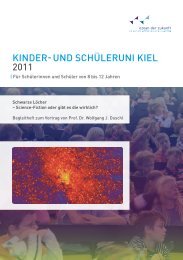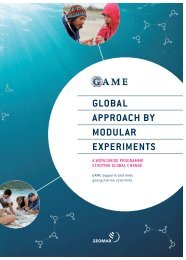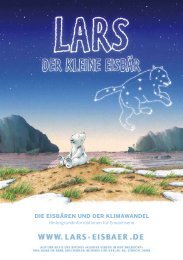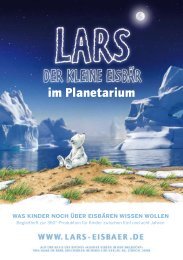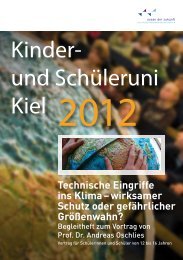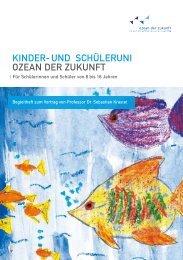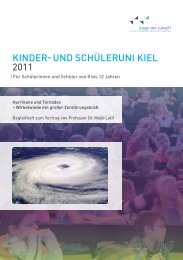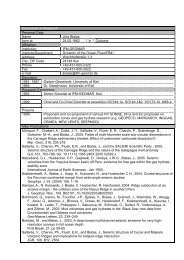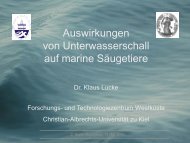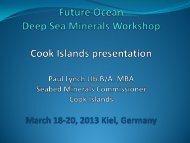Untitled - The Future Ocean
Untitled - The Future Ocean
Untitled - The Future Ocean
- No tags were found...
You also want an ePaper? Increase the reach of your titles
YUMPU automatically turns print PDFs into web optimized ePapers that Google loves.
2.2 <strong>The</strong>me B: Marine Resources and Risks<strong>Ocean</strong> change will lead both to new opportunities as well as to new risks for the world’s increasingpopulation. <strong>Ocean</strong>s provide resources and services to humankind, such as fish and seafood,genetic resources for medical purposes, fossil fuels and minerals. However, the sea is also asource of hazards through tsunamis, storm surges and sea-level rise. <strong>The</strong>se opportunities andrisks pose several general questions:• Which physical, chemical, biological, and geological mechanisms lead to the evolution ofcertain resources?• What are the mechanisms that lead to marine hazards threatening coastal population?• Are ocean organisms a model system for human diseases providing a new tool in medicalresearch?• How should ocean resources be managed in a sustainable manner and which institutionaland legal frameworks are necessary for such endeavors?• How can risks be assessed, how can damages from hazardous events be evaluated, andwhich countermeasures can be taken to mitigate these?<strong>The</strong>se and related topics will be addressed under <strong>The</strong>me B, which focuses on the understandingand management of marine resources and assessment of hazards. Research into marineresources and risks is currently being conducted in particular among the geosciences,medical/biosciences, and the social sciences. Proposed JRG’s will supplement and strengthen ongoingresearch at the CAU and the participating Leibniz Institutes and will establish links which areneeded to address emerging issues in this area.In the research project B1 fishery management will be studied with the special focus onmultispecies interaction and the link between commercial species, non-commercial species, andthe ecosystem. Marine life and fisheries are presently studied at IFM-GEOMAR, but have notpreviously been linked to economic expertise at CAU and IfW. Building on this expertise, a newJRG will be established to improve the management strategies of fish stocks and fisheries,incorporating economic, legal, and scientific aspects.Kiel-based scientists from medical and natural sciences will join for the first time to study marineorganisms as a model system with the purpose of gaining a better understanding of themechanisms which trigger human diseases (B2). <strong>The</strong> proponents and the new JRG will apply agenomics approach to investigate the evolution and function of orthologs to human susceptibilitygenes for barrier dysfunction in marine organisms from diverse phyla. This approach is possiblebecause the genes which cause barrier disease have been conserved through evolution. As anultimate goal, the knowledge required in the marine model organisms will be applied to developnovel therapeutic or preventive strategies for human barrier disorders.<strong>The</strong> study of the occurrence and formation of marine resources, such as gas hydrates andhydrothermal deposits, is an important focus of research in Kiel. However, further expertise isneeded in the area of fluid flow and coupled reactions, which are responsible for the formation ofthese deposits. This aspect will be addressed by a modeling-oriented new JRG in project B3 whichwill also serve to link existing research groups in this field. Despite growing concerns regarding61


